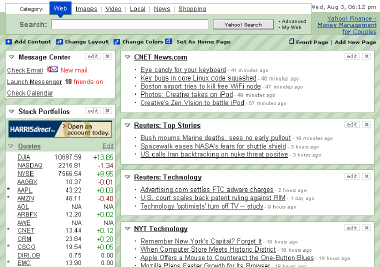A perfect storm for rich Internet apps

The latest craze among the search/shopping/mapping/community etc. portals is look-alike personalized pages. Access to news, e-mail, stock quotes, buddies, RSS subscriptions from a single dashboard. The current fashion is the bare bones interface, shorn of any unnecessary graphics and with some basic configuration capabilities. Unadorned simplicity is good, but with broadband speeds and technologies like Flash is the stripped down interface what users really need or want for their "home" pages? Or, is it just what they are given, and what has historically worked for Yahoo and Google, which were build on basic HTML search interfaces.
MyYahoo personalized page

Google personalized home page
We have access to all kinds of rich media that should be accessible in personalized pages, not just as links. Corporate portals, for example, present dashboards with all kinds of vital data and widgets that allow you to run a business from a few screenfuls of information. Web map applications from Google, Microsoft and Yahoo are becoming highly enriched and interactive.
A perfect storm is brewing for new kinds of personalized interfaces and applications that meld various media types and give users far more control over what is on their dashboard. You should be able to drag and drop widgets--your e-mail, stock portfolio, contacts, business metrics, feeds, playlists, TV shows, all within a standards-based browser environment. You should be able to perform tasks and interact without having to stray far from your personalized page. Laszlo Systems, for instance, has an open source platform for creating dashboards and rich Internet applications.
Prototype Laszlo dashboard
I'm not advocating that we should abandon the unadorned interface, but if broadband and media convergence are upon us, the sites with millions of users should at least give them the option of a rich Internet experience...